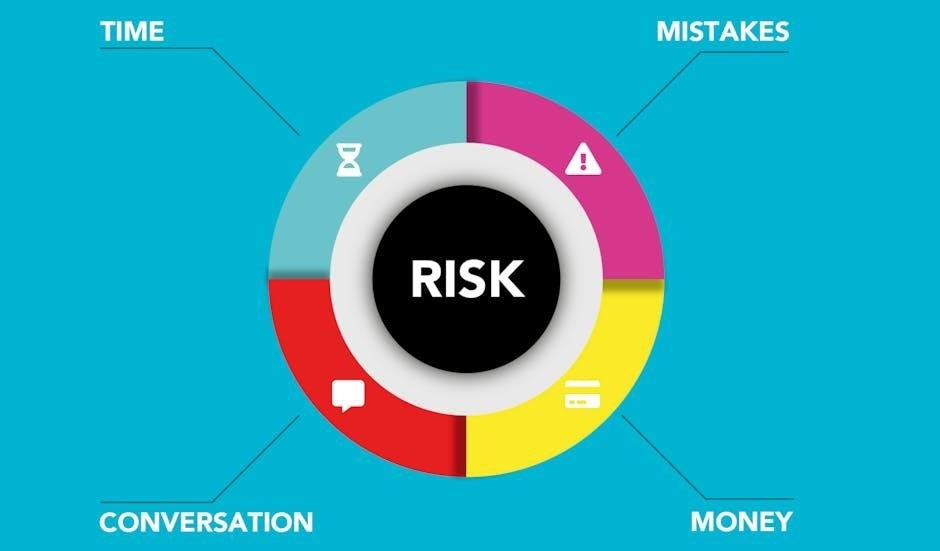The book explores how cognitive biases lead to mistake denial‚ significantly affecting decisions and relationships. Understanding these biases is crucial for personal growth and societal progress.
1.1. Overview of the Book “Mistakes Were Made (But Not by Me)”
Written by Carol Tavris and Elliot Aronson‚ this book delves into cognitive dissonance‚ explaining how people rationalize mistakes to maintain self-image. It explores the psychology behind self-justification‚ blame-shifting‚ and the refusal to admit errors. Through real-life examples‚ the authors reveal how these mechanisms damage relationships and hinder growth. The book offers insights into understanding and overcoming these biases for better decision-making and accountability in personal and professional spheres.
1.2. Importance of Understanding Cognitive Biases
Recognizing cognitive biases is essential for improving decision-making‚ fostering empathy‚ and building trust. By understanding these biases‚ individuals can identify patterns of self-deception‚ leading to greater self-awareness and accountability. This awareness promotes healthier relationships‚ personal growth‚ and societal progress by encouraging individuals to confront and learn from mistakes rather than denying them.

The Concept of Cognitive Dissonance
Cognitive dissonance is a psychological discomfort caused by conflicting thoughts or actions. It often leads to irrational behaviors‚ such as denying mistakes‚ to restore mental balance.
2.1. Definition and Explanation
Cognitive dissonance refers to the mental discomfort caused by holding conflicting beliefs‚ values‚ or behaviors. This psychological tension motivates individuals to rationalize or justify their actions‚ often leading to irrational decisions or denial of mistakes. It arises when self-image is threatened‚ prompting people to alter their perceptions or actions to restore consistency. This concept is central to understanding why individuals resist admitting errors‚ as explored in the book.
2.2. Role of Cognitive Dissonance in Mistake Denial
Cognitive dissonance drives individuals to deny mistakes by creating mental discomfort when their actions contradict their self-image. To alleviate this tension‚ people often rationalize or shift blame‚ avoiding accountability. This psychological mechanism protects ego but hinders growth and relationships. The book illustrates how dissonance fuels denial‚ highlighting its impact on decision-making and personal integrity. Addressing it requires self-awareness and a willingness to embrace imperfection.

The Psychology of Self-Justification
Self-justification is a defense mechanism where individuals rationalize their actions to maintain a positive self-image‚ often denying mistakes to avoid guilt and protect their ego.
3.1. How People Rationalize Their Actions
People rationalize their actions through self-deception‚ creating logical explanations to justify mistakes. This involves shifting blame‚ downplaying consequences‚ or reframing decisions to align with their self-image. Cognitive biases‚ like confirmation bias‚ further distort reality‚ making it easier to avoid accountability. Such rationalizations provide temporary emotional relief but hinder personal growth and damage relationships by perpetuating denial and reinforcing flawed behaviors over time.
3.2. The Mechanisms of Blame-Shifting
Blame-shifting involves attributing mistakes to external factors or others to avoid accountability. Techniques include projection‚ rationalizing‚ or minimizing consequences. This defense mechanism protects self-esteem but damages trust and relationships. By deflecting responsibility‚ individuals avoid guilt but also miss opportunities for growth and understanding. Chronic blame-shifting can escalate conflicts and hinder personal development‚ reinforcing a cycle of denial and perpetuating unresolved issues over time.

The Impact of Mistake Denial on Relationships
Mistake denial strains personal and professional relationships by fostering mistrust‚ communication breakdowns‚ and unresolved conflicts. It hinders emotional intimacy and mutual respect‚ complicating reconciliation and growth.
4.1. Strained Personal Relationships
Refusal to acknowledge mistakes often leads to emotional distance and resentment in personal relationships. Partners may feel unheard or unvalued‚ causing trust to erode over time. Persistent denial can escalate conflicts‚ as one party feels the need to justify their actions while the other seeks accountability. This dynamic fosters an environment of defensiveness rather than understanding‚ making it challenging to resolve disputes and strengthen bonds. Relationships suffer when accountability is replaced with excuses or blame-shifting.
4.2. Consequences in Professional Settings
Denying mistakes in professional environments can lead to a lack of accountability‚ fostering a culture where errors are ignored rather than addressed. This can result in stalled projects‚ poor decision-making‚ and diminished trust among colleagues. When individuals or leaders refuse to admit fault‚ it discourages transparency and collaboration‚ ultimately hindering organizational growth and innovation. The unwillingness to acknowledge mistakes can also damage professional reputations and create a toxic work environment.
The Role of Confirmation Bias
Confirmation bias fuels mistake denial by making individuals favor information that aligns with their beliefs‚ ignoring evidence that contradicts their actions or decisions‚ perpetuating flawed reasoning.
5.1. Selective Perception and Interpretation
Confirmation bias leads to selective perception‚ where individuals focus on information that aligns with their beliefs‚ while ignoring contradictory evidence. This skewed interpretation reinforces their existing views‚ making it easier to deny mistakes. By filtering out opposing perspectives‚ people create a self-reinforcing cycle of belief perseverance‚ which solidifies their stance and prevents accountability.
5.2. How Confirmation Bias Reinforces Denial
Confirmation bias intensifies mistake denial by leading individuals to favor information that validates their actions while rejecting contradictory evidence. This selective validation strengthens their belief in their correctness‚ making it harder to acknowledge errors. By consistently seeking comfort in affirming data‚ people reinforce their denial‚ creating a mental shield against accountability and fostering a cycle of self-justification that prevents growth and understanding.
The Sunk Cost Fallacy
The sunk cost fallacy occurs when individuals continue investing in a decision due to past commitments‚ even when it no longer makes sense‚ driven by the need to justify prior choices and avoid admitting mistakes.
6.1. Definition and Examples
The sunk cost fallacy involves continuing an unwise investment due to past commitments‚ even when it no longer benefits the individual. A common example is pouring more money into a failing business to “recoup losses‚” despite clear signs of failure. Another example is staying in a toxic relationship because of the time already invested‚ ignoring the emotional toll it takes. This bias often prevents people from cutting their losses and moving on‚ reinforcing the tendency to deny past mistakes.
6.2. Sunk Costs and Persistent Mistake Denial
The sunk cost fallacy fuels persistent mistake denial by making individuals reluctant to abandon investments‚ even when they no longer make sense. The more someone invests time‚ money‚ or effort‚ the harder it becomes to admit the mistake. This reluctance stems from a desire to avoid regret or feelings of incompetence. Over time‚ this behavior creates a cycle of justification‚ where individuals continue investing to validate past decisions‚ even when it leads to further harm. Recognizing this pattern is key to breaking it‚ as it often requires external perspective or self-awareness to acknowledge the futility of continuing; The book highlights how this mindset not only hinders personal growth but also strains relationships and impairs professional judgment‚ making it a critical barrier to accountability and learning from errors.

The Dangers of Groupthink
Groupthink fosters irrational decisions and suppresses dissent‚ leading to persistent mistake denial. The collective desire for unanimity prevents accountability and thwarts opportunities for learning from errors.
7.1. How Groups Avoid Accountability
Groupthink often leads to irrational decisions and a reluctance to acknowledge mistakes. Groups may rationalize failures‚ blame external factors‚ or disband rather than confront errors. This collective avoidance of accountability stems from a desire to maintain harmony and consensus‚ even when it means ignoring reality. Leaders often reinforce this behavior by discouraging dissent and promoting a unified front‚ further entrenching denial.
7.2. The Collective Escalation of Errors
Groupthink often leads to the collective escalation of errors‚ where poor decisions are compounded by continued investment in flawed choices. This phenomenon occurs as groups prioritize consensus over critical thinking‚ refusing to admit past mistakes. Psychological factors like sunk costs and the desire to protect the group’s image drive this behavior‚ resulting in larger‚ more entrenched errors over time.
The Role of Memory in Mistake Denial
Memory biases significantly influence mistake denial‚ as people often selectively recall or reinterpret past events to align with their self-image‚ distorting reality and avoiding accountability.
8.1. Biases in Memory Recall
Memory recall is often distorted by biases that protect self-image. Confirmation bias leads individuals to remember information that supports their beliefs‚ while selective memory ignores contradictory evidence. These biases prevent accountability by reinforcing the notion that mistakes are not their fault. Additionally‚ hindsight bias alters perceptions of past decisions‚ making it harder to admit errors. Such distortions contribute to persistent denial and the inability to learn from mistakes.
8.2. How Memory Distortions Shape Reality
Memory distortions alter perceptions of past events‚ shaping reality to align with self-image. These distortions‚ driven by cognitive dissonance‚ allow individuals to avoid accountability by reinterpreting or forgetting mistakes. Over time‚ such distortions create a false narrative‚ reinforcing the belief that errors were beyond their control. This manipulation of memory prevents personal growth and fosters a cycle of denial‚ making it difficult to confront and learn from past errors.
The Consequences of Not Admitting Mistakes
The consequences of not admitting mistakes include strained relationships‚ impaired problem-solving‚ and a significant hindrance to personal and professional growth‚ fostering a cycle of denial and stagnation.
9.1. Erosion of Trust and Credibility
Refusing to admit mistakes erodes trust and credibility‚ as others perceive a lack of accountability. This distrust can strain personal relationships and damage professional reputations. When individuals or organizations deny errors‚ others may question their honesty and reliability. Over time‚ this can lead to a breakdown in collaboration and respect‚ creating a cycle of suspicion and diminished faith in leadership and decision-making.
9.2. Long-Term Effects on Personal Growth
Refusing to acknowledge mistakes stifles personal growth by preventing learning from errors. This denial fosters a fixed mindset‚ where individuals avoid challenges and cling to outdated beliefs. Over time‚ this rigid thinking hinders self-improvement and innovation. By evading accountability‚ people miss opportunities to develop resilience‚ emotional intelligence‚ and wisdom. This stagnation can lead to unfulfilled potential and a lack of progress in both personal and professional realms.

Strategies for Overcoming Mistake Denial
Strategies include fostering self-awareness‚ embracing a growth mindset‚ and seeking constructive feedback. These approaches help individuals acknowledge errors and develop resilience‚ leading to better problem-solving and accountability.
10.1. Practicing Self-Awareness
Self-awareness involves recognizing personal biases‚ emotions‚ and thought patterns. By understanding these factors‚ individuals can objectively assess their actions and acknowledge mistakes without feeling threatened. Regular introspection and journaling can enhance this skill‚ fostering a mindset that values truth over ego. This awareness is foundational for personal growth and accountability‚ enabling individuals to confront errors constructively rather than deny them.
10.2. Encouraging a Growth Mindset
A growth mindset fosters resilience by viewing mistakes as opportunities for improvement rather than threats to ego. Encouraging this perspective helps individuals embrace challenges and learn from errors‚ reducing the need for denial. By valuing progress over perfection‚ people can develop a culture of accountability and continuous growth‚ both personally and professionally.

The Importance of Accountability
Accountability is essential for building trust and credibility‚ fostering a culture of responsibility and integrity. It promotes learning from errors and encourages transparency in personal and professional realms.
11.1. Taking Responsibility for Errors
Taking responsibility for errors is a cornerstone of accountability. It involves acknowledging mistakes openly‚ learning from them‚ and making amends when possible. By doing so‚ individuals build trust‚ credibility‚ and stronger relationships. Avoiding blame or denial fosters a culture of honesty and transparency‚ which is essential for personal and professional growth. Recognizing and addressing errors promptly can prevent their escalation and promote better decision-making in the future.
11.2. Learning from Mistakes
Learning from mistakes is essential for personal and professional growth. It involves reflecting on errors‚ identifying root causes‚ and implementing changes to avoid repetition. This process fosters resilience‚ improves judgment‚ and enhances integrity. Recognizing the value of mistakes encourages a mindset of continuous improvement‚ while denying or ignoring them can lead to stagnation and strained relationships. Embracing accountability ensures that errors become opportunities for meaningful development and progress.
How to Foster a Culture of Accountability
Promoting transparency‚ encouraging open dialogue‚ and rewarding honest feedback are key. Addressing biases and fostering a mindset that views mistakes as learning opportunities strengthens accountability.
12.1. Promoting Transparency and Openness
Promoting transparency involves fostering an environment where individuals feel safe to share information openly. Encouraging honest discussions about mistakes without fear of judgment reduces defensiveness and denial. Leaders should model this behavior by admitting their own errors and creating platforms for open feedback. Transparency breeds trust‚ which is essential for accountability. When people see that mistakes are acknowledged and addressed constructively‚ they are more likely to follow suit‚ reducing the tendency to deny or hide errors.
12.2. Encouraging Constructive Feedback
Encouraging constructive feedback fosters a culture where mistakes are acknowledged and addressed. It involves creating a safe environment where individuals can express concerns without fear of judgment. Leaders should model openness to feedback and ensure it is specific‚ timely‚ and focused on behavior rather than personality. Regular feedback loops and training on effective communication can enhance its effectiveness. Constructive feedback is a cornerstone of accountability and continuous improvement.
The Role of Education in Reducing Mistake Denial
Education plays a pivotal role in reducing mistake denial by fostering critical thinking and self-reflection. Teaching individuals to recognize biases and embrace accountability promotes personal and societal progress.
13.1. Teaching Critical Thinking Skills
Teaching critical thinking skills empowers individuals to evaluate information objectively and recognize biases. Educators can foster this by encouraging questioning‚ analyzing evidence‚ and exploring multiple perspectives. By promoting logical reasoning and self-reflection‚ critical thinking helps individuals identify flawed assumptions and overcome denial. This skill is vital for accountability and informed decision-making‚ enabling learners to acknowledge mistakes and grow from them.
13.2. Incorporating Real-World Examples
Incorporating real-world examples helps illustrate cognitive biases and mistake denial in relatable contexts. Using historical events‚ everyday scenarios‚ or case studies makes abstract concepts tangible. Educators can draw from well-documented errors‚ such as business failures or political decisions‚ to demonstrate how biases lead to denial. These examples enable learners to analyze patterns and consequences‚ fostering empathy and understanding. Real-world applications make the lessons more engaging and memorable.

The Benefits of Admitting Mistakes
Admitting mistakes fosters trust‚ integrity‚ and stronger relationships. It promotes personal growth by encouraging accountability and learning from errors‚ leading to improved decision-making and self-awareness over time.
14.1. Building Stronger Relationships
Admitting mistakes fosters trust and openness‚ essential for strong relationships. When individuals take responsibility‚ it demonstrates accountability and honesty‚ which deepen emotional connections and mutual respect. This sincerity creates a foundation for healthier communication‚ reducing misunderstandings and conflict. By acknowledging errors‚ people show vulnerability and a willingness to grow‚ which strengthens bonds and encourages empathy. Relationships built on such transparency are more resilient and enduring‚ fostering long-term harmony and understanding.
14.2. Enhancing Personal and Professional Integrity
Admitting mistakes demonstrates integrity‚ fostering trust and credibility. It reflects moral strength and accountability‚ aligning actions with ethical standards and values. Professionally‚ this builds respect and opportunities‚ while personally‚ it fosters self-respect and confidence. By embracing responsibility‚ individuals showcase their commitment to honesty and continuous improvement‚ which are cornerstone qualities for lasting success and a clear conscience in both personal and professional realms.
The book highlights the dangers of self-deception and irrational behavior‚ urging accountability and honesty. Embracing responsibility fosters personal growth‚ healthier relationships‚ and a more just society.
15.1. Recap of Key Points
The book delves into cognitive biases‚ self-justification‚ and memory distortions that prevent us from admitting mistakes. It explores how these mechanisms harm relationships‚ erode trust‚ and hinder personal growth. By understanding these psychological traps‚ individuals can embrace accountability‚ fostering healthier interactions and societal progress. Recognizing the futility of denial is the first step toward genuine change and collective improvement.
15.2. Final Thoughts on the Importance of Accountability
Accountability is the cornerstone of trust‚ credibility‚ and personal growth. Embracing responsibility for errors fosters resilience‚ stronger relationships‚ and a culture of transparency. Avoiding accountability leads to stagnation‚ strained relationships‚ and missed opportunities for improvement. By owning mistakes‚ individuals and societies can learn‚ adapt‚ and thrive. True progress begins with the courage to acknowledge flaws and the commitment to grow from them.
